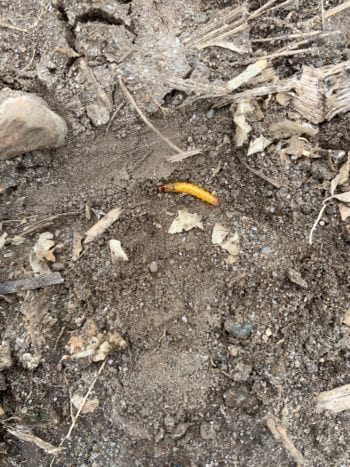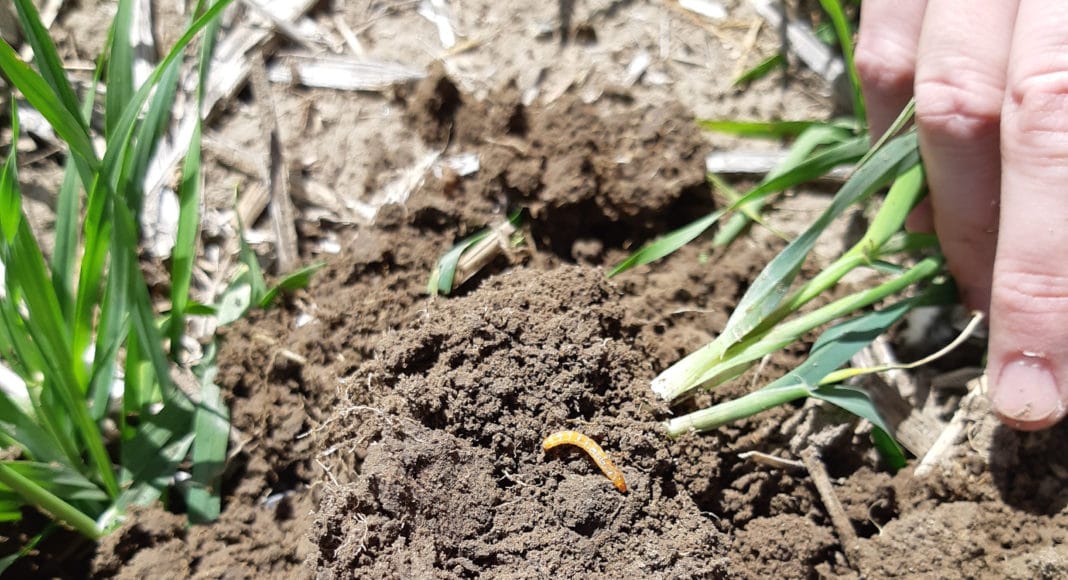A new wireworm control product from BASF, Cimegra, is giving growers hope following years of products being phased out.
Potato growers fearing a shrinking toolbox for wireworm control have a recent reason to cheer. This past fall, BASF announced Canada’s Pest Management Regulatory Agency (PMRA) had finalized registration for broflanilide.
The long-awaited Group 30 insecticide, the first Group 30 registered for use in Canada, offers in-season control as well as population control over difficult to manage chewing insects. Sold as Cimegra insecticide for use in potatoes and corn, the new product will be available to potato producers to apply in-furrow for the 2021 season.
Cimegra’s unveiling comes with excellent timing. In 2017, the PMRA ordered a three-year phaseout of the insecticide bifenthrin (Capture), requiring it be off retail shelves by Dec. 31, 2019 and no longer used by producers as of Dec. 31, 2020. PMRA continues to allow phorate (Thimet 20-G), but has implemented applicator system restrictions, making use more difficult and often cost prohibitive.
“We’ve been hoping for a new wireworm insecticide for quite some time,” says Ryan Barrett, research and agronomy specialist with the Prince Edward Island Potato Board. “We knew that broflanilide was being tested as part of the Canadian Horticultural Council’s wireworm trials for parts of the last two (Canadian Agricultural Partnership) funding clusters. But we didn’t know (which company) it was from or what it was called. About a year ago, we found out BASF was moving towards registration of a product. It’s been very exciting — new options and new chemistries are very welcome.”
Agriculture and Agri-Food Canada (AAFC) Research Scientist Christine Noronha led the research group which conducted broflanilide’s potato field trials on P.E.I. over the last handful of years. The team analyzed both the wireworm population and tuber damage at the end of the season as compared to populations and damage in fields treated with either Thimet, Capture or Titan (clothianidin).

The team found that in terms of both control and damage, Cimegra was similar or better to the other products. However, unlike Capture and Titan which only paralyze the insects for a season, allowing them to cause damage in subsequent seasons, Cimegra actually kills wireworm outright, explains Noronha.
“We also found when we went back to the site and put out bait samples in the fall, we were finding fewer worms in the plot compared to Thimet, which means we were actually reducing the population.”
Noronha is pleased with the Cimegra’s in-field efficacy as growers have been running out chemicals to use for wireworm control.
“As wireworm scientists, we’ve been trying to find a chemical that would work for years now. We are all very happy to have another tool in the toolbox,” she says.
Canada has about 30 wireworm species which prove costly to Canadian agricultural producers. P.E.I.’s potato fields are typically hardest hit.
“Wireworms have been quite the issue here in P.E.I., especially in the last 10 years,” explains Barrett. “It’s been a little better the last three or four years, due to a combination of weather conditions and growers using newer management tools. But, they’re a major cost to producers. In the fresh crop, more than one or two little holes is all it takes to make a potato unmarketable. If the damage is considerable, they can be an issue in processing too.”
While Noronha’s research shows Cimegra was successful against P.E.I.’s specific populations of wireworm, research trials across the country show similar results in other regions as well. She says trials run in British Columbia by AAFC Research Scientists Bob Vernon and Wim Van Herk showed similar damage and population reduction results to those achieved in the P.E.I. trials.
Meanwhile, BASF conducted its own trials across the Canadian Prairies at various sites in southern Alberta and southern Manitoba.
“In our prairie trials, we saw really positive results for reduction in damage,” says Allison Friesen, BASF’s technical marketing specialist for insecticides. She notes the early timing of seeding for winter cereals meant fall trapping wasn’t possible, so no wireworm population data is available for western Canadian fields. However, she says, “From the work we’ve completed, we do see good activity on diverse species of wireworm (in) both eastern and western Canada.”
The low rate of product required for effective control is another positive of the new product.
“With Thimet, the nature of the insecticide requires a large quantity of granules applied to the soil. But with Cimegra, it appears that you can get effective control with a very small amount of active ingredient per acre. That means residues will be limited,” Barrett says. “It’s definitely of interest anytime we can use a more targeted chemistry that’s not broad spectrum and that requires smaller amounts: that’s always good from a sustainability standpoint.”
To date, Cimegra has only been approved for use in Canada. Friesen says BASF hopes to complete its American registration in short order and expects registration in additional countries to follow.
“Once we are registered in the U.S., we will have harmonized MRLs for all of North America. We’re hoping for early Q1 next year for that,” says Friesen. From there, she says it typically takes two to three years for additional countries to come online.
For now, she recommends producers maintain very open communication with their buyers if they are considering using Cimegra on their potato fields.
“We’ve been proactively engaging with a lot of potato (processing) companies to understand where their distribution goes. We encourage anyone who is interested in using this product to talk to their processor, may that be a Cavendish or a McCain, about what they are accepting. If the (processed) product is staying within Canada or within North America, there is no issue with utilizing (Cimegra).”
Terence Hochstein, executive director with the Potato Growers of Alberta, estimates that 40 per cent or more of Alberta’s acres are impacted by wireworm. That number is likely to increase as the Alberta’s growing potato industry seeds into additional native ground and long-term hay acres.
He welcomes the new wireworm control option but urges caution due to the current lack of European MRLs.
“So much of our finished product is exported. Until MRLs are in place, we can’t touch it. You may see some seed growers try it but, in our industry — no. It’s off-limits.” But, he adds, “It’s great and it’s exciting, anytime you get a new grouping it’s a big deal. The science behind it is good.”
While Cimegra is exciting news for an industry in need of good wireworm control options, make no mistake, no chemical can solve all issues all by itself. To gain the upper hand over wireworm, farmers need to employ a range of effective IPMs — bait traps, biological control, good rotation, catch crops (like mustard and buckwheat), etc., Noronha says.
“You can’t just use one chemical or strategy: you have to manage your pest,” she says. “(Cimegra) is an important addition to our toolbox, but you need other tools in there too.”











